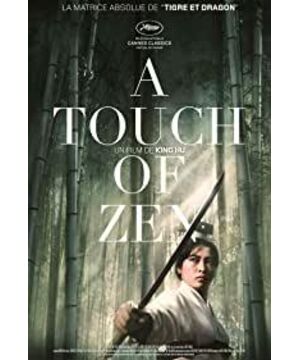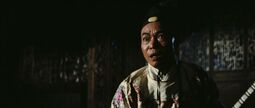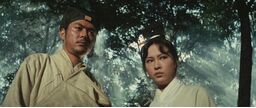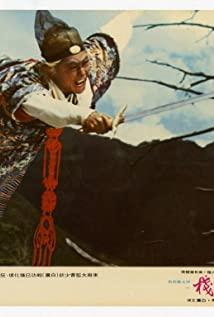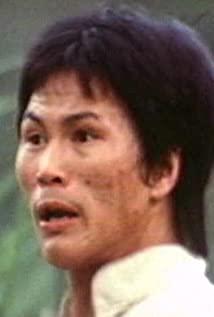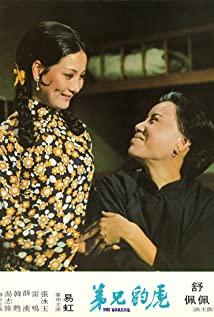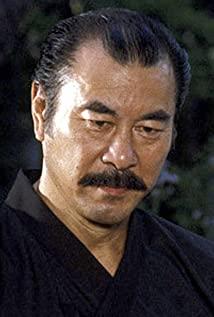In the past two days, I watched Hu Jinquan's two martial arts films, "Dragon Inn" and "Chivalrous Girl", among which "Chivalrous Girl" is the most outstanding.
The three scenes of fighting in the bamboo forest, chasing by the strange rocks, and fighting in the haunted house in "Chivalrous Girl" are extremely wonderful. Director Hu's picture composition is very beautiful, and he is good at combining both the enemy and the enemy in one picture to form a contrast of characters. This kind of plot and screen layout may come from a stage play (because it is limited by the size of the stage, it can only be between square inches. Construct two character scenes). Of course, this kind of composition sometimes feels unreal, and I don't quite understand why the characters in the play can't find the target, because they are clearly "underfoot". Director Hu's mirror movement is also very beautiful, there is always a feeling of rocker photography, which is rather mysterious.
The atmosphere of Director Hu's film is well grasped, adding tension to the plot through messy bamboo lines, mist, and the sound of wind chimes. Only now I know that Tsui Hark's martial arts movie style has borrowed a lot from director Hu Jinquan's lens language and composition, but the editing of Tsui Hark's films is more aggressive and improved, eliminating the part of director Hu's procrastination.
All kinds of jumping, cutting in the air, jumping and kicking trees in the martial arts design are originally from Hu Dao's movies. It is no wonder that Director Hu has such great influence in the martial arts genre films. Zhang Yimou's "House of Flying Daggers" and Ang Lee's "Crouching Tiger, Hidden Dragon" all drew on Hu Dao's shooting in the bamboo forest.
However, Director Hu's films are not without flaws. From a modern film perspective, the shortcomings are still obvious.
Director Hu is a screenwriter himself, and his weakness is that he is not very good at telling stories. He is not good at using suspense to promote the audience's expectations for the development of the plot, and only uses a sequential timeline to tell the story, with a large section of memories inserted.
Since it is a martial arts type film, it is originally a commercial film, so the portrayal of the characters is very superficial, or there is no portrayal, just to let the characters cooperate with the development of the plot, not to use the development of the plot to express the character's personality change. Judging from the movie "Chivalrous Girl" alone, there is no change in the characters in the play. Buddhist monks have always been merciful, and even if they are assassinated, they still purify all sentient beings. Yang Nuxia and Gu Shusheng are the same from beginning to end. Modern excellent commercial films have added human thinking, such as Nolan's Batman and the comic book "Venom".
The fight scenes are indeed very tasty, but the fights are repeatedly presented in different scenes, so that the rhythm of the whole film is lost, and the audience's emotions are not effectively mobilized. It reminds me of falling asleep in theaters watching "Avengers" and "Transformers," when all the dazzling special effects on the screen hypnotized me.
The soundtrack simply uses the opera soundtrack, which is too monotonous. On some occasions, the rhythm of musical instruments is frequently used to express the expected scene of ghosts, which is really out of tune. The actor's performance is also very face-to-face. Scholar Gu used a pair of "dead fish eyes" to practice from beginning to end, and all kinds of silly movements were suspected of "seeking and smoking". Yang Nvxia always has a serious expression, looks righteous and awe-inspiring, and has no acting skills at all. Looking at it this way, Zhao Dan, who played "Angel on the Road", his acting skills are really a master level.
Those who want to learn the composition and movement of film frames, as well as filmmakers who make martial arts movies, must see this movie. But for ordinary audiences, director Hu's films are really average, and they may or may not watch them. Although Director Hu is great, he is still incomparable with Akira Kurosawa. Akira Kurosawa's "Seven Samurai" is still very exciting, but it can be said that there is no urine point in the whole process.
Of course, limited by the level of the film industry in that era, it is admirable that director Hu Jinquan can produce such a film in 1971.
View more about A Touch of Zen reviews


